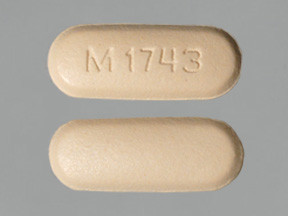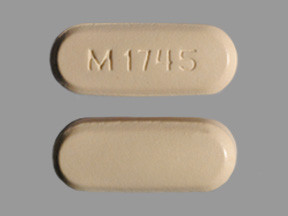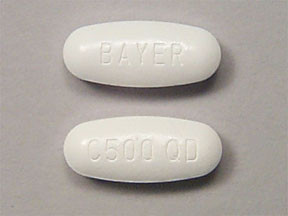CIPROFLOXACIN SUSTAINED-RELEASE - ORAL
PHONETIC PRONUNCIATION: (SIP-roe-FLOX-a-sin)
COMMON BRAND NAME(S): Cipro XR
GENERIC NAME(S): ciprofloxacin/ciprofloxacin HCl
Uses
USES: This medication is used to treat kidney or bladder (urinary tract) infections. Ciprofloxacin belongs to a class of drugs called quinolone antibiotics. It works by stopping the growth of bacteria. This antibiotic treats only bacterial infections. It will not work for virus infections (such as common cold, flu). Using any antibiotic when it is not needed can cause it to not work for future infections.
How to use CIPROFLOXACIN SUSTAINED-RELEASE - ORAL
HOW TO USE: Read the Medication Guide and, if available, the Patient Information Leaflet provided by your pharmacist before you start taking ciprofloxacin and each time you get a refill. If you have any questions, ask your doctor or pharmacist. Take this medication by mouth with or without food as directed by your doctor, usually once daily. Do not crush or chew this medication. Doing so can release all of the drug at once, increasing the risk of side effects. Also, do not split the tablets unless they have a score line and your doctor or pharmacist tells you to do so. Swallow the whole or split tablet without crushing or chewing. The dosage and length of treatment is based on your medical condition and response to treatment. Drink plenty of fluids while taking this medication unless your doctor tells you otherwise. Take this medication at least 2 hours before or 6 hours after taking other products that may bind to it, decreasing its effectiveness. Ask your pharmacist about the other products you take. Some examples include: quinapril, sevelamer, sucralfate, vitamins/minerals (including iron and zinc supplements), and products containing magnesium, aluminum, or calcium (such as antacids, didanosine solution, calcium supplements). Calcium-rich foods, including dairy products (such as milk, yogurt) or calcium-enriched juice, can also decrease the effect of this medication. Take this medication at least 2 hours before or 6 hours after eating calcium-rich foods, unless you are eating these foods as part of a larger meal that contains other (non-calcium-rich) foods. These other foods decrease the calcium binding effect. Ask your doctor or pharmacist about safely using nutritional supplements/replacements with this medication. For the best effect, take this antibiotic at evenly spaced times. To help you remember, take this medication at the same time(s) every day. Continue to take this medication until the full prescribed amount is finished, even if symptoms disappear after a few days. Stopping the medication too early may result in a return of the infection. Tell your doctor if your condition persists or worsens.
Side Effects
Precautions
Interactions
Overdose
Images

- color
- orange
- shape
- oblong
- imprint
- M 1743

- color
- orange
- shape
- oblong
- imprint
- M 1745
Reviews
Faq for CIPROFLOXACIN SUSTAINED-RELEASE - ORAL
Ciprofloxacin sustained-release oral is used to treat various bacterial infections such as urinary tract infections, respiratory tract infections, and skin infections.
Ciprofloxacin sustained-release oral belongs to a class of drugs called fluoroquinolone antibiotics. It works by stopping the growth of bacteria, thereby treating the infection.
Common side effects may include nausea, diarrhea, vomiting, headache, and dizziness. Severe side effects such as tendon rupture, severe allergic reactions, and liver problems are rare but can occur.
It is usually taken once a day with a full glass of water, preferably on an empty stomach or 2 hours after a meal. Follow your doctor's instructions and complete the full course of treatment.
Ciprofloxacin sustained-release oral may interact with certain medications like blood thinners, antacids, or corticosteroids. It is important to inform your doctor about all the medications you are taking, including over-the-counter drugs or herbal supplements.
It is generally not recommended to take ciprofloxacin sustained-release oral during pregnancy or breastfeeding, as it may harm the unborn baby or pass into breast milk. Consult your doctor for alternative options.
If you miss a dose, take it as soon as you remember. However, if it is close to the next scheduled dose, skip the missed dose and continue with your regular dosing schedule. Do not take a double dose to make up for the missed one.
The medication may start working within 1-2 days, but it is important to continue taking the full course as prescribed by your doctor, even if symptoms improve.
No, ciprofloxacin sustained-release oral is only effective against bacterial infections and will not work for viral infections like the common cold or flu.
Warning
WARNING: Quinolone antibiotics (including ciprofloxacin) may cause serious and possibly permanent tendon damage (such as tendonitis, tendon rupture), nerve problems in the arms and legs (peripheral neuropathy), and nervous system problems. Get medical help right away if you have any of the following symptoms: pain/numbness/burning/tingling/weakness in your arms/hands/legs/feet, changes in how you sense touch/pain/temperature/vibration/body position, severe/lasting headache, vision changes, shaking (tremors), seizures, mental/mood changes (such as agitation, anxiety, confusion, hallucinations, depression, rare thoughts of suicide). Tendon damage may occur during or after treatment with this medication. Stop exercising, rest, and get medical help right away if you develop joint/muscle/tendon pain or swelling. Your risk for tendon problems is greater if you are over 60 years of age, if you are taking corticosteroids (such as prednisone), or if you have a kidney, heart, or lung transplant. This medication may make a certain muscle condition (myasthenia gravis) worse. Tell your doctor right away if you have new or worsening muscle weakness (such as drooping eyelids, unsteady walk) or trouble breathing. Discuss the risks and benefits with your doctor before using this medication.
Disclaimer
IMPORTANT: HOW TO USE THIS INFORMATION: This is a summary and does NOT have all possible information about this product. This information does not assure that this product is safe, effective, or appropriate for you. This information is not individual medical advice and does not substitute for the advice of your health care professional. Always ask your health care professional for complete information about this product and your specific health needs.


No Reviews Yet